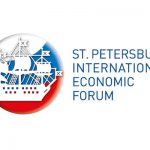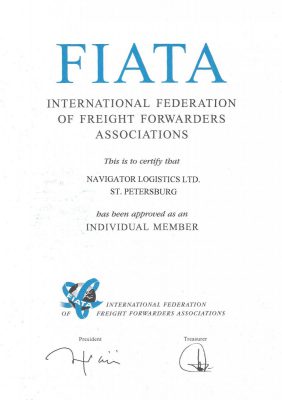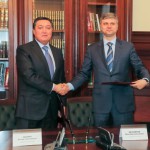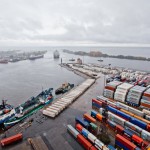 The keynote of the XX St. Petersburg International Economic Forum (SPIEF) was the striving to lift the economy out of crisis by means of a technological breakthrough and structural changes. Oil and gas companies asserted a high profitability of Arctic projects while railway companies promised to complete all the projects with the priority put on the approaches to the ports of the Southern Basin.
The keynote of the XX St. Petersburg International Economic Forum (SPIEF) was the striving to lift the economy out of crisis by means of a technological breakthrough and structural changes. Oil and gas companies asserted a high profitability of Arctic projects while railway companies promised to complete all the projects with the priority put on the approaches to the ports of the Southern Basin.
In his speech at the XX St. Petersburg International Economic Forum RF President Vladimir Putin emphasized the necessity to put a priority on hi-tech segments of economy. A presidential council for strategic development and priority projects headed by the President himself will be created for that purpose. The council presidium will be led by Prime Minister Dmitry Medvedev. The council will deal with key projects aimed at effecting structural changes in the economy and the social sphere, including those to support exports.
In the nearest future, oil and gas industry will undoubtedly remain the key driver of Russian economy. It will stimulate innovations and development of technologies needed for difficult to approach deposits of hydrocarbons the demand for which will continue growing in the long-term perspective.
When speaking about the future development of the oil and gas sector, we should focus on the Arctic. According to Rosneft CEO Igor Sechin, the resource potential of the Kara Sea fields is greater than Saudi Arabia’s resource base.
Meanwhile, there is an opinion that oil production is not profitable in the Arctic amid the low oil prices. However, Gazprom Neft CEO Aleksandr Dyukov emphasized at the Forum that Arctic oil production is profitable for the Company with its OPEX as high as 3$ per bbl of output when it comes to the Novoportovskoye field. “If we take Prirazlomnoye, OPEX is $11 per bbl, OPEX and CAPEX – $20 per bbl, or $7 per bbl when in stock. Average oil production cost in Russia, including transport component, does not exceed $10 per bbl. Igor Sechin also declared the change of technological mode in the oil and gas industry which requires an innovative approach and a higher role of the transport sector within it.
While these statements were made in Saint-Petersburg, the city saw the launching of the world’s most powerful nuclear-powered icebreaker Arktika, which confirms the readiness of the national industry to meet the current challenges.
Also, at the Forum, Rosneft and Fincantieri signed a Heads of Agreement for the formation of a joint venture focused on design and engineering of a new type of vessel to be built at the Zvezda shipbuilding complex (Primorsky Territory).
Russian tanker company Sovcomflot and VTB Bank, in their turn, signed a USD 260 million 13-year loan agreement which provides for the financing of construction of an Arctic LNG tanker for the Yamal LNG project. The vessel will have a 45 MW propulsion system, which is comparable to that of the nuclear icebreakers. Besides, Sovcomflot entered into a Memorandum of Understanding (MOU) with Gazprom Neft for the supply of marine lubricants.
Economic development is also impossible without the expansion of the railway infrastructure. Oleg Belozerov, President of Russian Railways, assured the Forum participants that all the current projects would be completed, though with certain adjustments .
«Adjustments are made for all the directions. Among the priorities I would emphasize the development of port infrastructure in the south, the development of the North-South corridors. These plans cover not only the territory of the Russian Federation … but also the work with Azerbaijan and Iran in respect of transit. We are now in negotiations on transportation of cargo via Azerbaijan and Iran to Europe. I would like to remind that the gross product growth in the Asian countries exceeds that of the highly developed countries by 1.5 times; the exchange of goods is multiplying… We see the potential in the development of transport corridors … these are the directions in our focus”, said Oleg Belozerov.
In this context we should put an emphasis on MOU signed by Rosmorport and NCSP in respect of the project on construction and operation of a dry cargo area in Taman seaport, the largest port project in the Southern Basin.
According to the President of Russian Railways, recent years have seen considerable change of traffic directions in our country. Most cargo flows used to go westwards and to the north-west while today these cargo flows decrease and eastward cargo flows are growing. In this context it is crucially important to expand the capacity of the Baikal-Amur Mainline (BAM) and the Trans-Siberian Railway (Transsib). Without this expansion it is difficult to speak about the trade with APR countries. Russian Railways President says the completion of this project has been postponed from 2018 to 2019. “The BAM and Transsib projects were initially scheduled for completion for 2018. Now we have made more precise scheduling with our partners (manufacturers and producers) and the calculations show that it is more profitable for us to postpone the deadline a little, by a year, to 2019. More that RUB 111 bln will be spent for implementation of the BAM and Transsib programme this year with the key focus made on the next year. Our investment programme foresees all the allocations so we have no questions as regards the implementation of the plans,” said Oleg Belozerov.
SPIEFs have traditionally been highlighting the essence of the current trends and specifying the direction of future developments. As of today, they are innovations and infrastructure. In general, Russia is quite successful in both though these developments are not as fast and easy as they could in a perfect world.
PortNews
Similar Posts:
-
The right time, the right place
In Vladivostok, from 3rd to 5th of September for the first time held East Economic Forum (WEF), which brought together representatives of government agencies of Russia and the Asia-Pacific region, -
Heads of Russian and Kazakh Railways agree on common approach for further development of Integrated Transport & Logistics Company
Oleg Belozerov, President of Russian Railways, and Askar Mamin, Chairman and President of Kazakhstan Temir Zholy, met in Moscow on 18 January 2016 to discuss the further development of the -
Most of MSCC Bronka facilities to be completed by 2018
The bulk of work on construction of facilities at Multipurpose Sea Cargo Complex Bronka (MSCC Bronka, Saint-Petersburg) is supposed to be completed by 2018. According to the official website of



